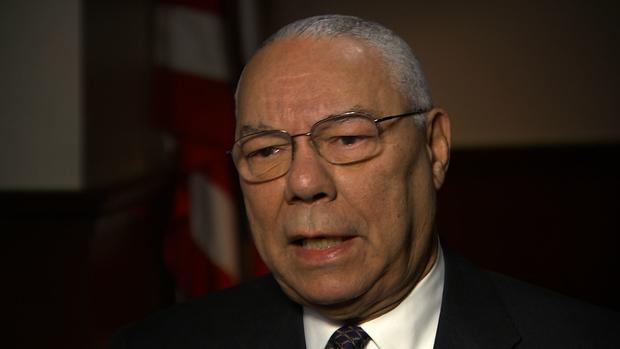Colin Powell reflects on lessons of Operation Desert Storm 25 years later
It's been 25 years since Operation Desert Storm and Colin Powell is now reflecting on the U.S. intervention in the Persian Gulf war and how it compares to the fight against the Islamic State in Iraq and Syria (ISIS).
In an interview with CBS News national security correspondent David Martin, Powell said it was a "great disappointment" to then-President George H. W. Bush that Saddam Hussein was not taken down during that conflict. But Powell wondered what the implications of such an outcome would have looked like.
"In retrospect, let's say Saddam had been taken down the next day. What would have replaced him? What was there to replace him?" Powell told Martin. "As we have learned in subsequent years, be careful what happens when suddenly the top comes off something and you don't know what is underneath."
"Reminds me a little of Syria of at this moment," he added, referring to the uncertainty surrounding the potential ousting of Syrian President Bashar al-Assad.
Powell, who served as the chairman of the joint chiefs of staff during the Gulf war, said the unintended consequence of the war was that Hussein was left standing.
"Ten years later he was such a problem that next President Bush felt it necessary to launch an operation to take him out," said Powell, who served as secretary of state under President George W. Bush during the Iraq war.
After Hussein ordered his military to invade Kuwait in 1990, the senior President Bush ordered Operation Desert Shield in August 1990 which several hundred thousand U.S. troops were placed in Saudi Arabia in case Iraq invaded that country as well. But after Bush issued an ultimatum to Hussein several months later, on Jan. 16, 1991, Bush ordered Operation Desert Storm in which the U.S. led a massive air offensive targeting the Iraqi military for several weeks. The conflict ended in February 1991, six months after the beginning of Desert Shield.
Powell said he thinks the U.S. learned the right lessons from Desert Storm, but he explained that the conflict with ISIS is very different. It's the difference between defeating a single army and defeating a movement.
"So it's not a simple military matter as it was back in the days of Desert Storm," Powell said. "It is a much more difficult war, it is a war not just armies clashing with one another; it is a war of holding ground."
On top of that, he warned that in the wake of 9/11 and the Arab Spring, the U.S. has to be "very, very careful in this new environment" in terms of the implications of its involvement and what happens when leaders of foreign governments are taken down or overthrown.

